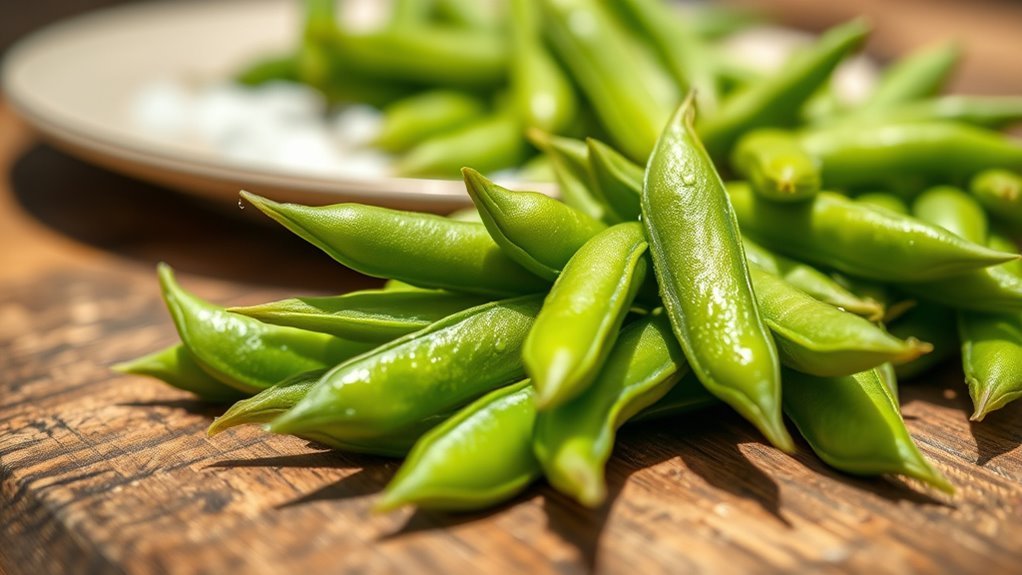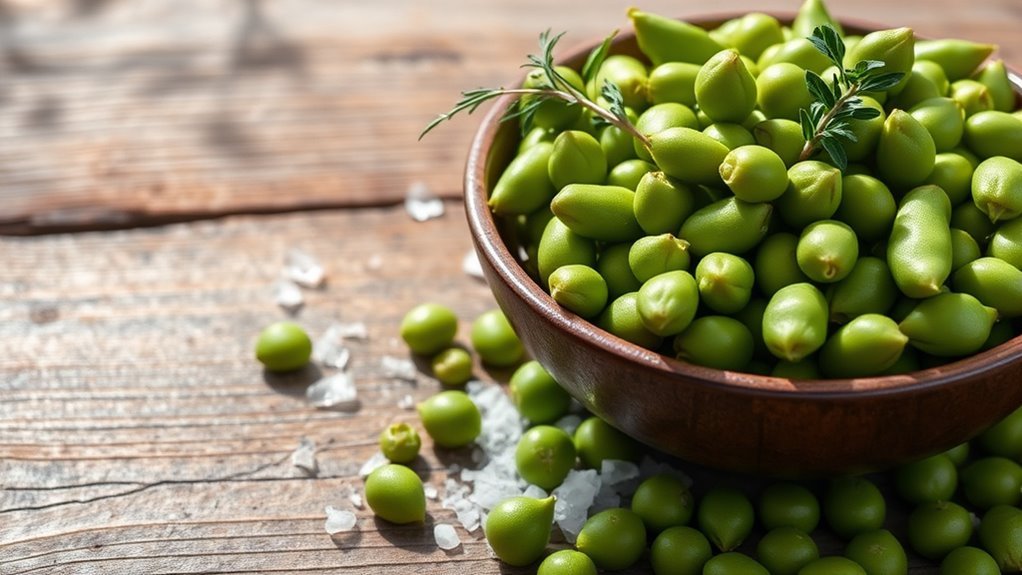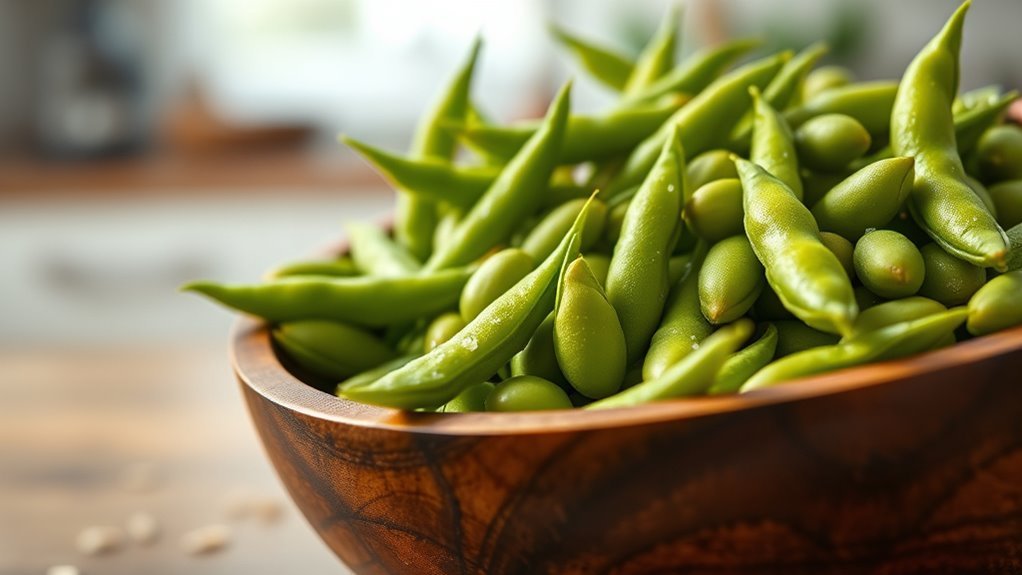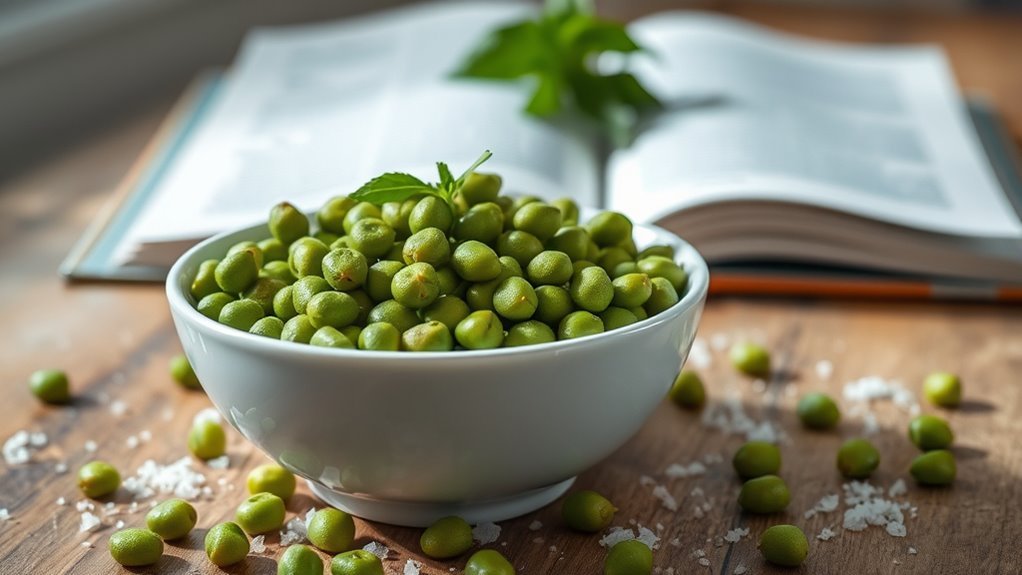Yes, edamame can fit into a keto diet. It contains about 14 grams of carbohydrates per cup, but with 8 grams of fiber, the net carbs are only around 6 grams. This makes it a nutritious option due to its high protein content of 18.4 grams per cup and beneficial fiber, promoting satiety. Portion control is key to include edamame without exceeding your carb limits. Explore more on how to incorporate it effectively into your meal plan.
Understanding the Ketogenic Diet

While many diets focus on calorie counting, the ketogenic diet emphasizes the importance of macronutrient ratios, particularly low carbohydrates and high fats. By adhering to ketogenic principles, you can shift your body into a state of ketosis, where it burns fat for fuel instead of glucose. This approach allows for various diet variations, accommodating personal preferences and lifestyle choices. For instance, some may opt for a strict keto plan, while others may include moderate carbohydrates. Understanding these principles can empower you to make informed choices that align with your goals. It’s not just about weight loss; it’s about achieving a sustainable lifestyle that maximizes your energy and mental clarity. Embrace the freedom to customize your path!
Nutritional Profile of Edamame

Edamame, young soybeans harvested before they fully mature, offer a nutritious option for those exploring their dietary choices. These little green powerhouses come in various edamame varieties, each providing essential nutrients. Typically, a serving contains protein, fiber, vitamins, and minerals, making them an excellent addition to your meals.
You can enjoy edamame through different cooking methods, like steaming or boiling, which preserve their nutritional benefits. Roasting is another tasty option, adding a crunchy texture. Whether you’re snacking or incorporating them into salads and stir-fries, edamame’s versatility makes it easy to fit into your lifestyle. By understanding their nutritional profile, you can make informed choices that align with your dietary goals.
Carbohydrate Content of Edamame

When considering edamame’s carbohydrate content, it’s important to look at its nutritional breakdown, which reveals how many carbs are in a typical serving. You might also want to compare its glycemic index to other foods to understand its impact on blood sugar levels. Finally, serving size plays an essential role in determining how edamame fits into your overall keto diet.
Nutritional Breakdown Overview
Understanding the carbohydrate content of edamame is essential for anyone following a ketogenic diet. Generally, one cup of cooked edamame contains about 14 grams of carbohydrates, but don’t forget that it also offers 8 grams of fiber, bringing net carbs down to around 6 grams. This makes edamame a relatively low-carb snack option, especially when compared to other legumes. For ideal edamame preparation, steaming or boiling are popular cooking methods that preserve its nutritional profile. Tossing it in olive oil and sea salt after cooking can enhance flavor without adding significant carbs. By keeping your portion sizes in check and incorporating edamame thoughtfully into your meals, you can enjoy its benefits while staying within your keto guidelines.
Glycemic Index Comparison
How do edamame’s glycemic index and carbohydrate content compare to other legumes? Edamame has a low glycemic index, typically around 15-20, making it a great choice for those monitoring blood sugar levels. In edamame comparison to other legumes like lentils or chickpeas, you’ll find that it contains fewer carbohydrates per serving. While lentils have a glycemic index of about 21-29, edamame’s lower index suggests it has less impact on your blood sugar. With roughly 7 grams of carbs per 100 grams, edamame stands out as a healthy option for those on a keto or low-carb diet. This makes it a versatile snack or addition to meals while allowing you to enjoy the freedom of flavorful eating.
Serving Size Considerations
A typical serving size of edamame is about 100 grams, which contains approximately 7 grams of carbohydrates. Understanding serving sizes is vital for effective portion control, especially if you’re following a keto diet. Here are some key points to take into account:
- Edamame can be a healthy snack, but mindful portioning is essential.
- Stick to 100-150 grams to keep carbs in check.
- Enjoy edamame as part of a balanced meal, incorporating other low-carb veggies.
- Track your carb intake to guarantee you stay within your daily limits.
Protein and Fiber Benefits
Edamame is a fantastic source of protein, making it a great addition to your keto diet. With about 18.4 grams of protein per cup, it helps support muscle maintenance and satiety. Plus, its rich fiber content aids digestion and can keep you feeling full longer.
High Protein Content
While you’re exploring keto-friendly options, it’s important to contemplate the high protein content of edamame, which can be a valuable addition to your diet. With its muscle-building properties, edamame packs a punch regarding nutrition. Here’s why it stands out:
- Contains about 18 grams of protein per cup
- Helps support muscle repair and growth
- A complete protein source with all essential amino acids
- Low in carbs, making it keto-compliant
Incorporating edamame into your meals can help you meet your protein goals without compromising your keto lifestyle. Whether you’re snacking or adding it to salads, this versatile food offers both nutrition and taste, allowing you to enjoy your meals while staying on track with your dietary choices.
Rich in Fiber
Fiber is an essential component of a healthy diet, and edamame shines in this area as well. Packed with around 8 grams of fiber per cup, edamame stands out among fiber sources, making it a smart addition to your meals. This fiber contributes to digestive health by promoting regularity and preventing constipation. Plus, it can help you feel fuller for longer, which is great if you’re watching your weight. Incorporating edamame into your diet not only boosts your fiber intake but also complements its high protein content, making it a balanced option. So, if you’re seeking a delicious way to enhance your fiber and protein levels while supporting digestive health, edamame could be your go-to choice.
Edamame Serving Sizes and Portions
When considering serving sizes for edamame, it’s helpful to know that a typical portion is around 1 cup of cooked soybeans, which contains approximately 189 calories. Understanding portion control is essential to maintain a balanced diet. Here are some tips to keep in mind:
- Aim for 1 cup as a standard serving size.
- Adjust portions based on your overall daily calorie needs.
- Pair edamame with other low-carb foods for a satisfying meal.
- Consider using edamame as a snack option, keeping servings moderate.
How Edamame Fits Into a Keto Meal Plan
If you’re following a keto meal plan, incorporating edamame can offer a nutritious option that aligns with your dietary goals. This young soybean is packed with protein and healthy fats, making it a great snack or side dish. You can easily add edamame to various edamame recipes, enhancing your meals while keeping carbs in check. For meal prep, consider steaming or sautéing edamame with garlic and olive oil, or tossing it into salads for added texture and flavor. Just remember to monitor portion sizes since these little pods do contain some carbohydrates. By thoughtfully including edamame in your meal plan, you can enjoy its benefits without straying from your keto objectives. Embrace the freedom of delicious, nutritious eating!
Alternatives to Edamame on Keto
While edamame can be a great addition to a keto meal plan, there are also several alternatives that can help you meet your nutritional needs without exceeding your carb limits. Here are some keto-friendly snacks and low carb vegetables you might consider:
- Cucumber slices – Invigorating and crunchy, perfect for dipping.
- Celery sticks – Low in calories and carbs, great with cream cheese.
- Zucchini chips – Baked or dehydrated, they offer a satisfying crunch.
- Broccoli florets – Packed with vitamins and low in carbs, ideal for snacking.
These alternatives provide variety in your diet while keeping your carb intake in check. Feel free to experiment with dips and seasonings to make them even more enjoyable!
Health Benefits of Edamame
Although you might think of edamame primarily as a tasty snack, it also offers several health benefits that can enhance your overall well-being. Packed with protein and fiber, edamame supports satiety, making it a great choice for those watching their weight. Its antioxidant properties help combat oxidative stress, which can lead to chronic diseases. Furthermore, the healthy fats found in edamame contribute to heart health by promoting healthy cholesterol levels. Studies suggest that regular consumption of soy products, including edamame, may lower the risk of heart disease. By incorporating edamame into your diet, you’re not just enjoying a delicious treat; you’re also taking proactive steps towards better health and wellness. Embrace the benefits edamame has to offer!
Tips for Incorporating Edamame Into Your Diet
To seamlessly incorporate edamame into your diet, consider adding it to salads, stir-fries, or grain bowls for a nutritious boost. This versatile ingredient can elevate your meals while keeping them keto-friendly. Here are some tips to get you started:
Incorporate edamame into salads, stir-fries, or grain bowls for a nutritious, keto-friendly boost to your meals.
- Make edamame hummus for a protein-packed dip.
- Use steamed edamame as a topping for your favorite keto salad.
- Add it to stir-fries for an extra crunch and flavor.
- Snack on roasted edamame for a healthy alternative to chips.
With these edamame recipes and ideas for keto snacks, you’ll find it easy to enjoy this delicious legume while staying on track with your dietary goals. Embrace the freedom of flavorful, nutritious eating!
Frequently Asked Questions about Edamame and the Keto Diet
1. Is edamame suitable for a keto diet?
Yes, edamame can be included in a keto diet, but moderation is key. While edamame is relatively low in carbohydrates compared to other legumes, it still contains some carbs. A 1-cup serving of cooked edamame has about 8 grams of carbohydrates, 4 grams of fiber, and around 11 grams of protein. This makes it a good source of plant-based protein while keeping your carb intake lower than many other bean options.
2. How many carbs are in edamame?
A 1-cup serving of shelled, cooked edamame contains approximately 8 grams of total carbohydrates. However, it also has about 4 grams of dietary fiber, which means the net carbs are roughly 4 grams per serving. This low net carb count makes edamame a viable option for those following a ketogenic diet.
3. What are the health benefits of eating edamame?
Edamame is rich in nutrients and offers various health benefits. It is an excellent source of protein, which is essential for muscle repair and growth. Additionally, it contains healthy fats, particularly omega-3 and omega-6 fatty acids, which are beneficial for heart health. Edamame is also high in antioxidants and vitamins such as vitamin K, folate, and vitamin C, which contribute to overall health and well-being.
4. Can I eat edamame if I’m trying to lose weight on keto?
Yes, you can eat edamame while trying to lose weight on a keto diet, but it’s important to monitor your portion sizes. Due to its relatively low carb content and high protein, edamame can help keep you feeling full and satisfied. Including it in your meals as a snack or side dish can provide nutritional benefits without significantly impacting your carb limit, which is crucial for weight loss on keto.
5. How can I incorporate edamame into my keto meals?
There are many delicious ways to incorporate edamame into your keto meals. You can enjoy it steamed as a snack, add it to salads for a protein boost, or blend it into dips like edamame hummus. Additionally, consider using edamame in stir-fries or grain-free bowls to enhance flavor and nutrition. Just remember to keep your portions in check to stay within your carb limits.
References
- https://www.healthline.com/nutrition/edamame-keto
- https://www.webmd.com/diet/what-is-keto-diet
- https://www.ncbi.nlm.nih.gov/pmc/articles/PMC6410735/
- https://www.medicalnewstoday.com/articles/323952
- https://www.mayoclinic.org/healthy-lifestyle/nutrition-and-healthy-eating/expert-answers/keto-diet/faq-20457913
- https://www.diabetes.org/nutrition/healthy-foods/what-to-eat/vegetables
- https://www.reuters.com/article/us-health-ketogenic-diet-vegetables-idUSKBN2A81Y4
- https://www.hsph.harvard.edu/nutritionsource/healthy-weight/diet-reviews/keto-diet/
- https://www.eatright.org/health/wellness/healthy-living/the-ketogenic-diet-and-what-you-need-to-know


